School-of-Management-管理学院(系)剖析说课讲解
管理学英语ppt课件ppt课件
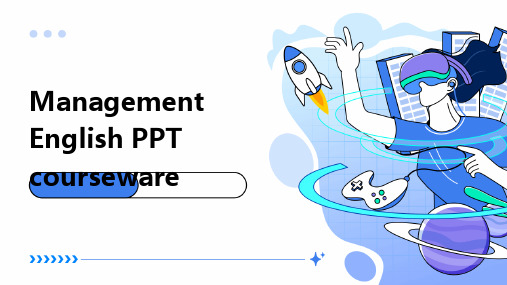
Risk control
Analyze potential risks, develop response measures, and ensure organizational safety.
Feedback and improvement
Collect feedback information, continuously improve management methods and processes.
Managerial Skills
Strategic vision
With a broad vision and the ability to plan for the long term.
Decision making ability
Scientifically analyze problems and make decisive decisions.
Communication and coordination skills
Good at communication and able to coordinate the interests of all parties.
Leadership
Unleash team potential and lead the team to grow together.
Establish an effective information communication mechanism to ensure the accuracy and timeliness of information transmission.
Leading
Motivation and Communication
《管理学(全英)》-课程教学大纲
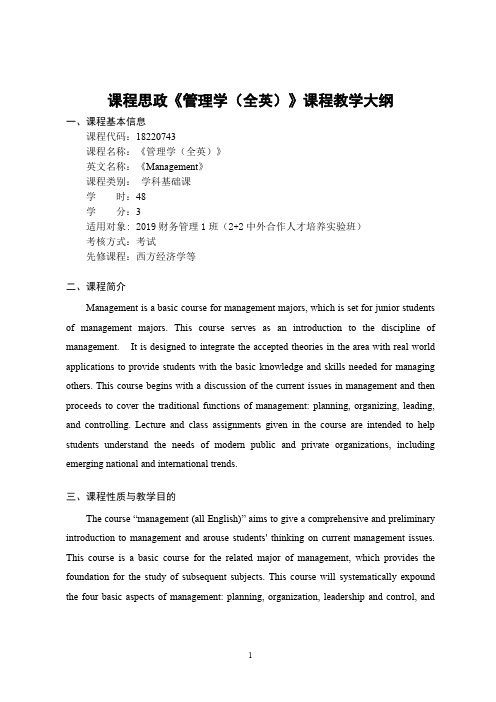
课程思政《管理学(全英)》课程教学大纲一、课程基本信息课程代码:18220743课程名称:《管理学(全英)》英文名称:《Management》课程类别:学科基础课学时:48学分:3适用对象:2019财务管理1班(2+2中外合作人才培养实验班)考核方式:考试先修课程:西方经济学等二、课程简介Management is a basic course for management majors,which is set for junior students of management majors.This course serves as an introduction to the discipline of management.It is designed to integrate the accepted theories in the area with real world applications to provide students with the basic knowledge and skills needed for managing others.This course begins with a discussion of the current issues in management and then proceeds to cover the traditional functions of management:planning,organizing,leading, and controlling.Lecture and class assignments given in the course are intended to help students understand the needs of modern public and private organizations,including emerging national and international trends.三、课程性质与教学目的The course“management(all English)”aims to give a comprehensive and preliminary introduction to management and arouse students'thinking on current management issues. This course is a basic course for the related major of management,which provides the foundation for the study of subsequent subjects.This course will systematically expound the four basic aspects of management:planning,organization,leadership and control,andwill try to apply the theory into case analysis under the guidance of teachers.At the end of the course,students should be able to analyze problems in the management field from a more professional perspective and master common technical terms in the field.Due to the basic course of management,the study of this course also lays a foundation for the subsequent study of related courses,such as strategic management,human resource management,e-commerce,organizational behavior,etc.This course uses English textbooks and the classroom language is English.Therefore,it has a higher requirement for the teaching object.Students should generally have a high level of English,and have strong oral English ability.Through the study of this course,four teaching objectives can be achieved:1.The construction of management knowledge system:to enable students to master thebasic concepts and connotations of management,various management theories, knowledge construction and curriculum system construction.2.The improvement of various skills:to enable students to think and analyze themanagement phenomenon in today's business environment with all kinds of knowledge, and break through traditional knowledge to achieve thinking innovation.3.The improvement of English listening,speaking,reading and writing ability:as thiscourse is an all-English teaching form,it will have requirements on students'English skills in all aspects.4.The strengthening of ideological and political education:to enable students tocomprehensively and objectively understand contemporary China and look at the outside world,be good at distinguishing right from wrong,and form a stand,viewpoint and method for observing and understanding contemporary world and contemporary China.四、教学内容及要求Chapter1The introduction of management:history,concepts and framework Chapter main Contents:1.Tell who managers are?2.What three characteristics do all organizations share?3.What’s the definition of management?4.Make comparison between managers and non-managerial employees.5.Three ways to look at what managers do.6.Explain why it’s important to study management.7.Describe the factors that are reshaping and redefining management.8.Scientific Management,General Administrative Theory,Behavioral Approach,Systems Approach.Chapter Objectives:Emphasis:1.Understand three Common Characteristics of Organizations.2.what’s the difference between Managers and non-managerial Employees?Difficulties:what does a manager do?Elements of ideological and political education:patriotismChapter Assignments:Please list at least three kinds of job titles in modern company and attribute these titles to four management levels.Chapter2The management environment analyses and applicationChapter main Contents:1.Explain what the external environment is and why it’s important?2.Discuss how the external environment affects managers?3.Define what organizational culture is?4.Describing the dimensions of organizational culture.5.How organizational culture affects managers?Chapter Objectives:Emphasis:what does external environment include?And how these factors affect the management?Difficulties:know the organizational culture?And how to evaluate an organization’s culture?Elements of ideological and political education:an international visionChapter Assignments:Please select one industry you are interested in and make the analyses about it’s external environment?Chapter3Integrative managerial issuesChapter main Contents:1.How to understand the concept of“globalization”and its reflection.2.What’s the influence of globalization on organizations?3.How organizations go global?And what are the different types of globalorganizations?4.What managers need to know about the management in global business?5.Discuss how society’s expectations are influencing managers and organizations.6.Discuss the factors that lead to ethical and unethical behavior in organizations.7.Describe how the workforce is changing and its impact on the way organizations aremanaged.Chapter Objectives:Emphasis:1.The meaning of globalization and it’s effect on management2.the diversity of workforceDifficulties:understanding the effect of firm globalization on company management.Elements of ideological and political education:an holistic viewChapter Assignments:Please conclude the effects of globalization effects on company management.Chapter4Foundation of decision makingChapter main Contents:1.Describe the decision-making process and some points about every step.2.What common errors are committed in the decision-making process?(12commondecision errors)3.Explain the three approaches managers can use to make decisions.4.Describe the types of decisions and decision-making conditions managers face.5.Discuss group decision-making,knowing the advantage and disadvantage of groupdecision making.6.When are groups most effective?7.Discuss contemporary issues in managerial decision making(national culture,creativity and design thinking,big data)Chapter Objectives:Emphasis:The three levels of analysis in the OB model.Difficulties:The need for a contingency approach to the study of OB.Elements of ideological and political education:socialism with Chinese characteristicsChapter Assignments:Think over whether you have made some errors in decision making?What’s it?Chapter5Foundation of planningChapter main Contents:1.Discuss the nature and purposes of planning?2.Since changing is ever-stopping,is the formal planning necessary?3.Explain what strategic includes and what managers do in the strategic managementprocess?4.What strategies do mangers use?pare approaches to goal setting and planning.6.How do managers set goals and develop plans?7.What contemporary issues in planning do managers face?Chapter Objectives:Emphasis:1.The company strategy system2.The content of MBO3.The steps and methods of goal-settingDifficulties:1.The essence of MBO2.The company strategy systemElements of ideological and political education:confidence in our path,in our theoriesChapter Assignments:If“The don’t change thing is change itself”is the real fact,what’s the meaning of planning?Chapter6Organizational structure and designChapter main Contents:1.What are the six key elements in organizational design?(specialization,departmentalization,authority,span of control,centralization,formalization)2.Identify the contingency factors that favor either the mechanistic model or theorganic model of organizational design.pare traditional and contemporary organizational designs.4.Discuss the design challenges faced by today’s organizations.(keep employeesconnected,global difference,building a learning organization,flexible workarrangement and so on)Chapter Objectives:Emphasis:The six key elements in organizational design.Difficulties:The design challenges faced by today’s organizations.Elements of ideological and political education:confidence in our systemChapter Assignments:Do you think the traditional hierarchical structure still have life today? Chapter7Managing human resourcesChapter main Contents:1.Describe the key components of the human resource management process andthe important influences on that process.2.What’s employment planning?And what’s the two steps of it?3.How do organizations recruit employees?And how to handle layoffs?4.How do managers select competent employees?5.What is employees are provided with needed skills and knowledge?6.Describe strategies for retaining competent,high-performing employees.7.Discuss contemporary issues in managing human resources.Chapter Objectives:Emphasis:1.The process of human resource management;2.How to compensate the employees;3.How to retain competent,high-performing employees.Difficulties:Grasping the process of HRM and how to match the job requirements and employee?Elements of ideological and political education:China’s national conditionChapter Assignments:How to retain the90s and00s employees?Chapter8Managing change and innovationChapter main Contents:1.Define organizational change and the categories of organizational change.2.what forces lead to organizations make change?pare the change process.(CALM WATERS VS.WHITE-WATERMETAPHOR)4.what forces resist the organization change?5.Explain how to manage resistance to change?6.What managers need to know about employee stress?7.Discuss techniques for stimulating innovation.Emphasis:1.What’s organizational change are companies confronted with?2.What can the companies do to eliminate the employees’stress?3.How to create innovation?Difficulties:What can companies do to make the organization more creative?Elements of ideological and political education:a sense of prideChapter Assignments:1.What method do you know about prompting one more creative?2.Do you have some method to decrease the stress?Chapter9Group and managing work teamsChapter main Contents:1.What’s the definition of group and what are the stages of group development?2.Describe the five major concepts of group behavior.(roles,norms andconformity,status systems,group size,group cohesiveness)3.How groups are turned into effective teams?From context,composition,workdesign and process perspectives.4.What contemporary issues do managers face in managing teams?(managingglobal team,)Chapter Objectives:Emphasis:1.how to build an effective work team?2.what issues does a manager must confronted with in new environments?Difficulties:How to build an effective work team?Elements of ideological and political education:organization confidenceChapter Assignments:Do you want to work in team or work individually?Why?Chapter10Motivating and rewardingChapter main Contents:1.Define and explain motivation and what’s three elements of motivation?pare four early theories of motivation(Maslow’s Hierarchy of NeedsTheory,X-Y Theory,Two-Factor Theory,McClelland’s Three-needs Theory)3.What’s goal-setting theory?4.How does job design influence motivation?5.What’s equity theory?6.What current issues do managers face in motivating employees?Chapter Objectives:Emphasis:Compare and integrate the classical and modern motivation theoryDifficulties:How to apply these motivation theories to realities?Elements of ideological and political education:responsibilityChapter Assignments:What factors can motivate you working harder?Chapter11Leadership and trustChapter main Contents:1.Who is leader and what is leadership?2.What traits do leaders have according trait theory?3.What behaviors do leaders exhibit?4.Describe the four major contingency leadership theories.5.Describe modern views of leadership and the issues facing today’s leaders.6.Why trust is the essence of leadership?Chapter Objectives:Emphasis:How to understand the contingency leadership theory?Difficulties:How to understand the essence role of trust in leadership?Elements of ideological and political education:integrity and honestyChapter Assignments:Imaging you are a leader,what do you want to do to build the trust relationship with employees?Chapter12Managing communication and informationChapter main Contents:1.Describe what managers need to know about communicating effectively.2.Explain how technology affects managerial communication.3.Discuss contemporary issues in communication.Chapter Objectives:Emphasis:1.What’s the process of communication?paring written communications and verbal communication.3.Which factors will lead to the ineffectiveness in communication?4.How to enhance the communication effect?5.Understanding the effects of some technology on managing communication.6.What communication issues do managers face today?Difficulties:How to tackle the resistance when communication?Elements of ideological and political education:development and innovationChapter Assignments:Please recall the last low-efficient communication case in your daily life and analyze the reason.Chapter13Foundation of controlChapter main Contents:1.What is control and why control is important?2.Describe the three steps in the control process.(get measuring,compare actualperformance to planned goals,take actions)3.When does control take place?4.Discuss the types of controls organizations and managers use.5.What contemporary control issues do managers confront?Chapter Objectives:Emphasis:Grasp three kinds of control.Difficulties:When does control take place?Elements of ideological and political education:ideal and faithChapter Assignments:Which method do you think is most effective when controlling?why?五、各教学环节学时分配Presentation and debate033 Chapter9Group and managing work teams33 Chapter10Motivating and rewarding(I)33 Chapter10Motivating and rewarding(II)213 Chapter11Leadership and trust33 Chapter12Managing communication and213 informationChapter13Foundation of control33 Review and answering033六、推荐教材和教学参考资源1、《21世纪的管理挑战》,彼得.德鲁克著2、《创新者的窘境》&《创新者的解答》,克莱顿•克里斯坦森著3、《竞争战略》迈克尔.波特著4、《影响力》罗伯特.西奥迪尼著5、《定位》艾·里斯,杰克·特劳特著6、《商战》杰克•特劳特/阿尔•里斯著7、《联盟:互联网时代的人才变革》里德·霍夫曼著8、《重新定义管理》布赖恩·罗伯逊著七、其他说明大纲修订人:田野修订日期:2020/12/10大纲审定人:赵明审定日期:2020/12/16。
《管理学》(Management)(英文大纲).ppt

2019-9-9
感谢你的欣赏
11
Part 4 Organizing
Chapter 10 Organizational Structure and Design
Defining organizational structure Organizational design decisions Common organizational designs
The decision-making process The pervasiveness of decision making The manager as decision maker
2019-9-9
感谢你的欣赏
8
Part 3 Planning(Cont’d)
Chapter 7 Foundations of Planning
2019-9-9
感谢你的欣赏
16
Part 5 Leading(Cont’d)
Chapter 15 Understanding Groups and Teams
Understanding group behavior Turning group into effective teams Developing and managing effective teams
2019-9-9
感谢你的欣赏
21
Part 6 Controlling(Cont’d)
Chapter 20 Controlling for Organizational Performance
Organizational performance Tools for monitoring and measuring
伦敦大学学院(UCL)管理学院项目汇总
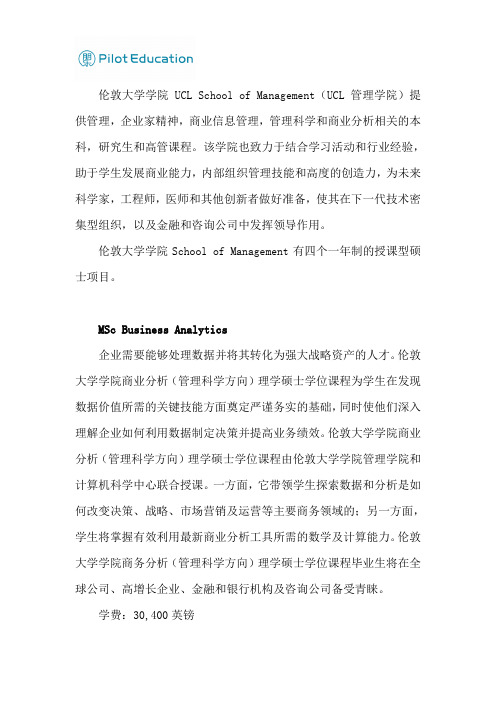
伦敦大学学院 UCL School of Management(UCL管理学院)提供管理,企业家精神,商业信息管理,管理科学和商业分析相关的本科,研究生和高管课程。
该学院也致力于结合学习活动和行业经验,助于学生发展商业能力,内部组织管理技能和高度的创造力,为未来科学家,工程师,医师和其他创新者做好准备,使其在下一代技术密集型组织,以及金融和咨询公司中发挥领导作用。
伦敦大学学院School of Management有四个一年制的授课型硕士项目。
MSc Business Analytics企业需要能够处理数据并将其转化为强大战略资产的人才。
伦敦大学学院商业分析(管理科学方向)理学硕士学位课程为学生在发现数据价值所需的关键技能方面奠定严谨务实的基础,同时使他们深入理解企业如何利用数据制定决策并提高业务绩效。
伦敦大学学院商业分析(管理科学方向)理学硕士学位课程由伦敦大学学院管理学院和计算机科学中心联合授课。
一方面,它带领学生探索数据和分析是如何改变决策、战略、市场营销及运营等主要商务领域的;另一方面,学生将掌握有效利用最新商业分析工具所需的数学及计算能力。
伦敦大学学院商务分析(管理科学方向)理学硕士学位课程毕业生将在全球公司、高增长企业、金融和银行机构及咨询公司备受青睐。
学费:30,400英镑时长:12个月网申开放时间:未更新(2019: 11月1日)截止日期:未更新(2020: 8月5日)滚动式录取申请费:150英镑申请要求●本科学位:- 中国大学均分成绩85以上(双非大学建议88以上)- 申请必须具备非常强的数理能力,大多数录取者都来自管理,数学,工科,计算机科学,经济学和心理学等专业。
●语言成绩:- 雅思总分最低 7.0,小分不低于6.5- 托福总分最低100分,阅读写作小分不低于24,口语和听力不低于20●两封学术推荐信●面试要求:如被考虑,会以邮件形式通知MSc EntrepreneurshipUCL管理学院的MSc企业家专为打算创办和经营具有高影响力的创新业务的学生而设计。
管理学(英语)教学大纲

《管理学(英语)》教学大纲课程编号:课程类型:学科基础课总学时:48讲课学时:实验(上机)学时:学分:3适用对象:工业工程先修课程:无一、课程的教学目标《管理学(英语)》是为工商管理学院工商管理专业国际班本科生开设的专业基础课,本课程通过全英文授课的形式,向学生传授管理学的基本概念、重点理论和一般方法,帮助学生树立和开阔国际化视野,熟悉前沿的现代管理理念,培养较高的管理学科素养,为进一步学习专业管理课程和从事管理工作打下坚实的管理知识基础。
同时,通过本课程的学习,学生将具备较高水平的管理学专业英语阅读能力和运用英语进行管理沟通的能力,进而为将来学习其他管理学相关的双语或全英文课程、出国交流与深造、加入国际化公司工作奠定基础。
二、教学基本要求(黑体,小四号字)教学基本要求应包括:本课程主要教学内容包括管理与组织导论、管理思想史、织的文化与环境、全球环境中的管理、社会责任与管理道德、决策、计划、战略管理、组织结构与设计、管理沟通与信息技术、人力资源管理、变革与创新管理、领导、理解群体与团队、激励员工、控制、运营等。
其中,社会责任与管理道德、决策、战略管理、变革与创新管理、领导、理解群体与团队等内容将采取课堂教授与案例分析方法,以便学生能够灵活掌握这些章节的知识点。
教学方法与手段:运用启发式教学、案例教学等方式,寓教于乐,激发学生的学习热情,强调学生在课堂学习中的自主意识,主张使学生成为课堂的主人,在教学中运用多媒体手段并配合板书,强调学习过程学生的参与。
对实践教学环节的要求:为了保证学生在课后能积极思考,课后需要布置一定量的案例讨论或思考题,并在下节课留出一定课时在课堂讨论,课堂发言和课后作业作为平时成绩之一。
课程的考核方式:建议本课程综合采用多种考核方法,案例分析成绩占总成绩40%,期末考试宜采取闭卷的方式,占总成绩的60%。
三、各教学环节学时分配(黑体,小四号字)教学课时分配4.3 Doing Business Globally.4.4 Managing In A Global Environment.四、教学内容Chapter1Introduction to Management and Organizations1.1 Who Are Managers?▪Explain how managers differ from non-managerial employees.▪Describe how to classify managers in organizations.1.2 What Is Management?▪Define management.▪Explain why efficiency and effectiveness are important to management.1.3 What Do Managers Do?▪Describe the four functions of management.▪Explain Mintzberg’s managerial roles.▪Describe Katz’s three essential managerial skills and how the importanceof these skills changes depending on managerial level.▪Discuss the changes that are impacting manager’s jobs.▪Explain why customer service and innovation are important to the manager’s job.1.4 What Is An Organization?▪Explain the characteristics of an organization.▪Describe how today’s organizations are structured.1.5 Why Study Management?▪Discuss why it’s important to understand management.▪Explain the universality of management concept.▪Describe the rewards and challenges of being a manager.教学重点、难点:本章重点讲授管理的基本概念、职能,管理者的类型、角色和技能,管理学科与其他学科的关系。
802《管理学》课程教学大纲_管理学
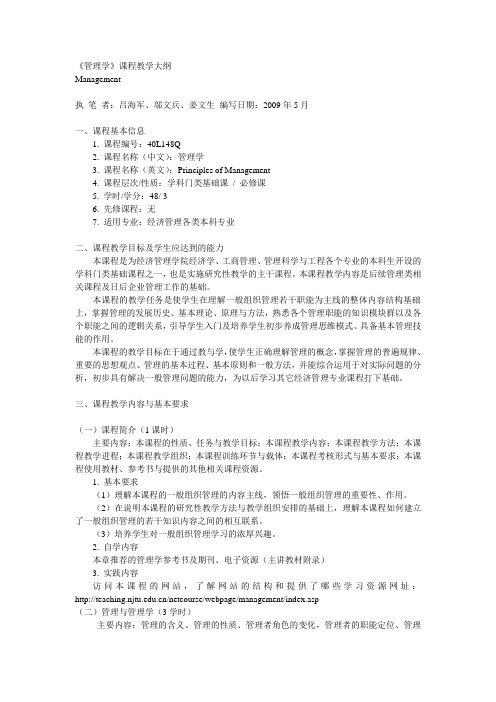
《管理学》课程教学大纲Management执笔者:吕海军、邬文兵、姜文生编写日期:2009年5月一、课程基本信息1. 课程编号:40L148Q2. 课程名称(中文):管理学3. 课程名称(英文):Principles of Management4. 课程层次/性质:学科门类基础课/ 必修课5. 学时/学分:48/ 36. 先修课程:无7. 适用专业:经济管理各类本科专业二、课程教学目标及学生应达到的能力本课程是为经济管理学院经济学、工商管理、管理科学与工程各个专业的本科生开设的学科门类基础课程之一,也是实施研究性教学的主干课程。
本课程教学内容是后续管理类相关课程及日后企业管理工作的基础。
本课程的教学任务是使学生在理解一般组织管理若干职能为主线的整体内容结构基础上,掌握管理的发展历史、基本理论、原理与方法,熟悉各个管理职能的知识模块群以及各个职能之间的逻辑关系,引导学生入门及培养学生初步养成管理思维模式、具备基本管理技能的作用。
本课程的教学目标在于通过教与学,使学生正确理解管理的概念,掌握管理的普遍规律、重要的思想观点、管理的基本过程、基本原则和一般方法,并能综合运用于对实际问题的分析,初步具有解决一般管理问题的能力,为以后学习其它经济管理专业课程打下基础。
三、课程教学内容与基本要求(一)课程简介(1课时)主要内容:本课程的性质、任务与教学目标;本课程教学内容;本课程教学方法;本课程教学进程;本课程教学组织;本课程训练环节与载体;本课程考核形式与基本要求;本课程使用教材、参考书与提供的其他相关课程资源。
1. 基本要求(1)理解本课程的一般组织管理的内容主线,领悟一般组织管理的重要性、作用。
(2)在说明本课程的研究性教学方法与教学组织安排的基础上,理解本课程如何建立了一般组织管理的若干知识内容之间的相互联系。
(3)培养学生对一般组织管理学习的浓厚兴趣。
2. 自学内容本章推荐的管理学参考书及期刊、电子资源(主讲教材附录)3. 实践内容访问本课程的网站,了解网站的结构和提供了哪些学习资源网址:/netcourse/webpage/management/index.asp(二)管理与管理学(3学时)主要内容:管理的含义、管理的性质、管理者角色的变化,管理者的职能定位、管理学的基本原理,本章案例。
管理学双语课程中英文简介

《管理学》课程中英文简介Management课程代码:020013A Course Code:020013A课程名称:管理学Course Name:Management学时:48 Periods:48学分:3 Credits:3考核方式:考试Assessment:Examination先修课程:无Preparatory Courses:None管理学是经济、管理类专业的专业基础课程和核心课程,是一门系统地研究管理过程的普遍规律、基本原理和一般方法的科学。
本课程详细讲解了计划、组织、领导与控制等管理职能的客观规律和实施方法。
课程采用课堂教学、科研和实践活动一体化的教学方式,以课堂教学为主,科研和社会实践活动为辅,加强学生对管理学理论和知识的理解和认识,增强学生参与管理实践的意识。
本课程的任务是使学生能够系统地掌握管理学的知识体系,能综合运用管理学的基本理论和方法,并分析和解决管理中的实际问题,为后续专业课程的学习奠定管理学基础。
Management, the basic and core discipline of economics and management students, is a science which systematically studies the universal law, basic principles and general methods of the management process. This course teaches the objective laws and methods of the management functions in details, such as planning, organizing, leading and controlling etc. In order to strengthen the students‟ understanding of the management‟s theory and knowledge and enhance awareness of participating in the management practices, the course uses a teaching method including classroom teaching,researching and social practicing. Classroom teaching is the main part, while others are auxiliary. This course‟s target is to enable students to master the management‟s knowledge system, to apply basic theories and methods, to analyze and solve practical problems in management and lay a good management foundation for follow-up study of major disciplines.《管理学》(双语)课程中英文简介Management(double-language)课程代码:020023A Course Code:020023A课程名称:管理学(双语)Course Name:Management(double-language)学时:48 Periods:48学分:3 Credits:3考核方式:考试Assessment:Examination先修课程:经济学Preparatory Courses:Economics教学目标:本课程是工商管理专业(实验班)的学科基础课,它通过传授管理学的基本概念、基本理论和基本方法,使学生掌握管理的基本规律,具备管理者的基本素质和技能,为进一步学习专业管理课程和从事管理工作奠定基础。
管理学说课稿

管理学说课稿各位评委⽼师好:尊敬的各位评委⽼师,⼤家上午好,我是第XX组XX号选⼿,本科就读于⼈⼒资源管理专业。
从⼩我就⽴志成为⼀名优秀的⼈民教师,可以帮助学⽣们答疑解惑,扫除求学道路上的障碍。
我严格要求⾃⼰,提升⾃⼰的综合素质,以期待着将来可以⾛上这三尺讲台,完成⾃⼰的理想,帮助更多的学⼦实现他们的梦想。
主讲《管理学》这门课程。
今天说课的题⽬是《管理学》的第七章第四节《⼈员的培训与发展》(板书)。
下⾯我将从说教材、说教法、说学法和说教学程序这四个⽅⾯进⾏说课。
恳请各位⽼师批评指正!⼀、⾸先我来说下教材根据我校学⽣实际我选⽤的教材是由北京⾼等教育出版社出版的,陈传明教授主编的《管理学》(马⼯程教材)。
第七章⼈员配备中是管理学中不可或缺的⼀部分,⽽⼈员的培训与发展⼜是⼈员配备过程中的必要环节。
员⼯培训的主要内容主要有三部分,分别是:根据著名教育⼼理学家布鲁姆的教学⽬标分类理论、结合教学⼤纲和学⽣的特点,本课时确定了以下教学⽬标:第⼀,知识⽬标。
使学⽣了解⼈员培训的功能,理解⼈员培训的任务,掌握⼈员培训的⽅法。
第⼆,能⼒⽬标。
通过对⼈员培训的⽅法的分析,提⾼学⽣⾃主探索、独⽴思考的能⼒,培养学⽣理论联系实际解决问题的能⼒。
第三,情感⽬标。
提⾼学⽣对员⼯培训的重视,树⽴终⾝学习的观念。
针对明确的教学⽬标我确定的教学重点是⼈员培训的任务和⽅法,难点是员⼯培训⽅法的选择。
确定依据是为了理解和掌握了上述内容才能使学⽣理解组织培训的⾏为,并掌握有关培训的相关理论。
⼆、其次我来说教法为了充分发挥学⽣在课堂的主体地位,调动学⽣学习的积极性,我主要采⽤了讲授法、案例教学法、讨论法、启发式教学法和多媒体教学法来讲授新课。
运⽤案例教学法和多媒体教学法,突出重点、突破难点。
通过⽣动的教学案例、直观的图表展式,充分激发学⽣学习的积极性,同时深化学⽣对员⼯培训的理解和应⽤能⼒。
运⽤讨论法、启发式教学法,加深学⽣对知识的理解,训练学⽣⾃主探索和独⽴思考的能⼒。
chapter 02 The Evolution of Management Theory 《管理学》(双语)课程课件(48学时)

Breaking down the total job allowed for the division of labor in which workers became very skilled at their specific tasks.
16
2. Fayol’s Principles of Management
Line of Authority
– A clear chain of command from top to bottom of the firm.
Centralization
– The degree to which authority rests at the top of the organization.
9
4. Four Principles of Scientific Management
Principles to increase efficiency:
- Study the ways jobs are performed now and determine new ways to do them.
10
5. Problems with Scientific Management
5.1 Managers frequently implemented only the increased output side of Taylor’s plan.
– Workers did not share in the increased output.
人教版七年级英语上册Unit3SectionAWhatisyourschoollike说课稿
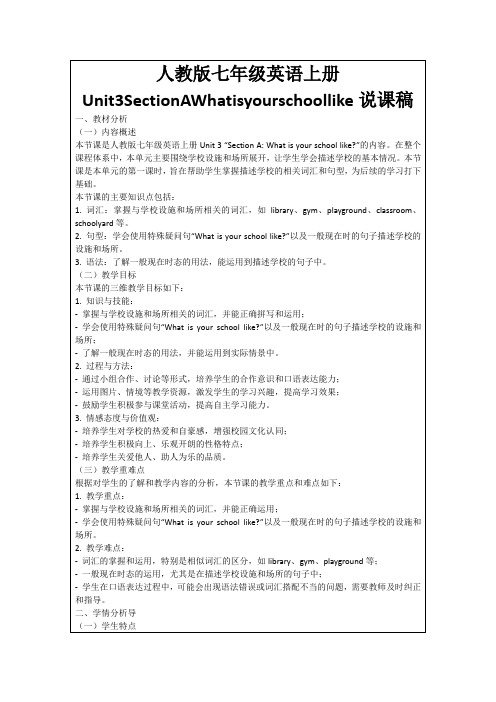
应对策略:
1.针对时态问题,通过讲解典型例句、设计相关练习,帮助学生巩固掌握。
2.口语表达方面,鼓励学生多练习,并进行同伴互评,提高表达能力。
课后评估教学效果:
1.通过课后作业、课堂反馈了解学生的学习情况,评估教学效果。
2.对学生的作业进行详细批改,发现并分析问题,为改进教学提供依据。
1.创设情境:通过展示学校实景图片、视频等,让学生置身于真实语境中,激发他们的学习兴趣。
2.互动游戏:设计角色扮演、小组竞赛等互动游戏,让学生在轻松愉快的氛围中学习英语。
3.激励评价:对学生的每一次进步给予及时表扬和鼓励,增强他们的自信心,提高学习积极性。
4.任务驱动:布置具有挑战性的任务,引导学生主动探究、合作学习,激发他们的学习动力。
3.情境教学法:利用图片、视频等资源,创设情境,帮助学生更好地理解教学内容。理论依据是情境认知理论,认为知识是在特定情境中建构的。
(二)媒体资源
我将使用以下教具、多媒体资源或技术工具辅助教学:
1.教具:实物模型、图片、卡片等,用于展示学校设施和场所,帮助学生直观地理解和记忆词汇。
2.多媒体资源:学校实景图片、视频、PPT等,丰富教学手段,提高学生的学习兴趣。
3.右侧:简要列出一般现在时态的用法,并以典型例句辅助说明。
板书风格:采用双色粉笔,突出重点,区分层次;使用简洁的图标和线条,使板书更具视觉吸引力。
板书在教学过程中的作用:
1.有助于学生抓住本节课的知识结构,快速理解和记忆重点内容。
2.引导学生关注课堂教学的进程,提高课堂参与度。
3.便于教师总结和回顾,提高教学效果。
3.情境练习:设计真实语境,让学生运用所学词汇和句型进行口语练习,巩固新知。
管理学基础说课稿

管理学基础说课稿尊敬的各位评委老师:大家好!今天我说课的内容是《管理学基础》。
下面我将从课程定位、课程目标、教学内容、教学方法、教学资源、教学过程和考核评价这七个方面来进行阐述。
一、课程定位《管理学基础》是管理类专业的一门专业基础课,也是一门理论性和实践性都很强的课程。
它旨在为学生提供管理的基本概念、原理和方法,培养学生的管理思维和实践能力,为后续的专业课程学习和未来的职业发展打下坚实的基础。
这门课程在管理类专业课程体系中起着承上启下的作用。
它的前导课程包括经济学基础、社会学基础等,后续课程则有市场营销学、人力资源管理、财务管理等。
通过本课程的学习,学生能够系统地了解管理的基本理论和方法,掌握管理的职能和过程,为学习其他专业课程提供必要的理论支持和方法指导。
二、课程目标(一)知识目标学生能够理解和掌握管理的基本概念、原理和方法,包括管理的定义、职能、管理者的角色和技能、管理理论的发展历程等。
(二)能力目标培养学生运用管理理论和方法分析和解决实际管理问题的能力,如制定计划、组织资源、领导团队、控制过程等。
同时,提高学生的沟通能力、团队协作能力和创新能力。
(三)素质目标培养学生的管理意识和职业素养,如责任感、敬业精神、团队合作精神、创新精神等,使学生具备成为一名优秀管理者的基本素质。
三、教学内容本课程的教学内容主要包括以下几个模块:(一)管理与管理学介绍管理的定义、职能、管理者的角色和技能,以及管理学的研究对象和方法。
(二)管理理论的发展讲述古典管理理论、行为管理理论、现代管理理论等的主要观点和代表人物,让学生了解管理理论的发展脉络。
(三)计划与决策包括计划的类型、编制过程和方法,决策的类型、程序和方法等内容,培养学生的计划和决策能力。
(四)组织讲解组织的设计、组织结构的类型、组织变革与发展等,使学生掌握组织管理的基本知识和技能。
(五)领导阐述领导的概念、领导理论、领导方式和艺术,培养学生的领导能力。
管理学原理英文教材(清华大学出版社)中文翻译精简版
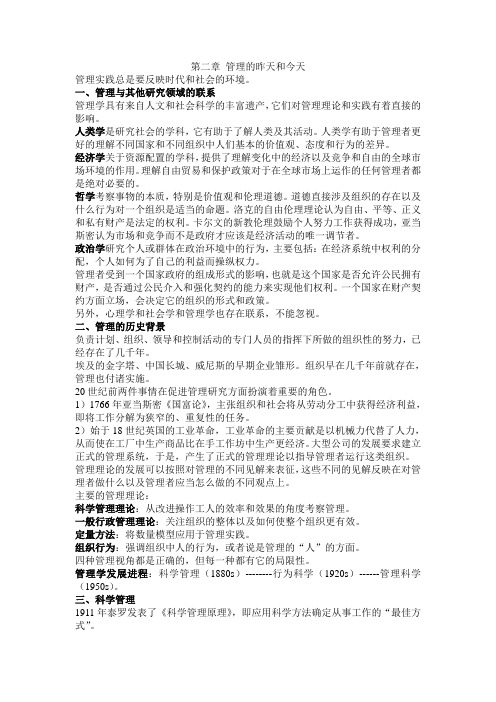
第二章管理的昨天和今天管理实践总是要反映时代和社会的环境。
一、管理与其他研究领域的联系管理学具有来自人文和社会科学的丰富遗产,它们对管理理论和实践有着直接的影响。
人类学是研究社会的学科,它有助于了解人类及其活动。
人类学有助于管理者更好的理解不同国家和不同组织中人们基本的价值观、态度和行为的差异。
经济学关于资源配置的学科,提供了理解变化中的经济以及竞争和自由的全球市场环境的作用。
理解自由贸易和保护政策对于在全球市场上运作的任何管理者都是绝对必要的。
哲学考察事物的本质,特别是价值观和伦理道德。
道德直接涉及组织的存在以及什么行为对一个组织是适当的命题。
洛克的自由伦理理论认为自由、平等、正义和私有财产是法定的权利。
卡尔文的新教伦理鼓励个人努力工作获得成功,亚当斯密认为市场和竞争而不是政府才应该是经济活动的唯一调节者。
政治学研究个人或群体在政治环境中的行为,主要包括:在经济系统中权利的分配,个人如何为了自己的利益而操纵权力。
管理者受到一个国家政府的组成形式的影响,也就是这个国家是否允许公民拥有财产,是否通过公民介入和强化契约的能力来实现他们权利。
一个国家在财产契约方面立场,会决定它的组织的形式和政策。
另外,心理学和社会学和管理学也存在联系,不能忽视。
二、管理的历史背景负责计划、组织、领导和控制活动的专门人员的指挥下所做的组织性的努力,已经存在了几千年。
埃及的金字塔、中国长城、威尼斯的早期企业雏形。
组织早在几千年前就存在,管理也付诸实施。
20世纪前两件事情在促进管理研究方面扮演着重要的角色。
1)1766年亚当斯密《国富论》,主张组织和社会将从劳动分工中获得经济利益,即将工作分解为狭窄的、重复性的任务。
2)始于18世纪英国的工业革命,工业革命的主要贡献是以机械力代替了人力,从而使在工厂中生产商品比在手工作坊中生产更经济。
大型公司的发展要求建立正式的管理系统,于是,产生了正式的管理理论以指导管理者运行这类组织。
管理学说课设计比赛(精美模板)

【内容】:中国传统的管理;西方传统的管理;西方现代管理理论;
理论与方法;了解西方现代管理理论的主要学派以及发展趋势,了
解我国现代管理理论与实践的发展过程。
【重点】:古典管理理论的主要代表人物及其理论;现代
管理理论丛林。
【难点】:现代管理理论丛林的认识。
课程总体介绍
---课程大纲内容
课题三 组织环境与组织文化(6学时)
【重点】:控制的类型,控制的标准,实现有效控制的原
则,控制的基本方法。 【难点】:控制的标准,实现有效控制的原则。
02
课程教材
课程教材
-----与教学目标符合情况
管理的实践日新月异,管理的理论层出不穷,管理学 的国外经典教材也不断被引进。为了更好地适应应用型高 等教育的发展,更加突出时代性、实践性、应用性特点,
---课程大纲内容
讲课(节) 4 4 6 8 8 2 2 1 1 1 1 课堂讨论(节) 作业(次)
课题六 领导
课题七 控制 复习
8
8 2
2
2
1
1
合计
48
8
课程总体介绍
课题一
---课程大纲内容
管理的基本知识(4学时)
【内容】:掌握管理的定义、职能,理解管理的特征、性质;掌握 管理学的概念、研究对象与研究方法;了解管理者的定义与分类; 掌握管理者应具有的技能;把握管理工作的对象与范围。 【要求】:了解管理的基本知识和管理的基本内容,明确管理学的 研究对象、性质、学科体系。
课程总体介绍
---课程教学目标
课程在专业中的目标
使学生正确理解管理的概念,掌握管理的普 遍规律、基本原理和一般方法,并能综合运 用于实际问题的分析,初步具有解决一般管 理问题的能力
管理学课程及英文
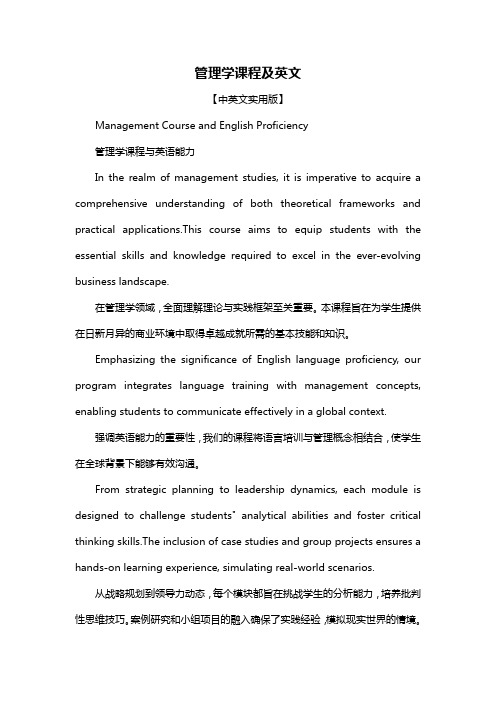
管理学课程及英文【中英文实用版】Management Course and English Proficiency管理学课程与英语能力In the realm of management studies, it is imperative to acquire a comprehensive understanding of both theoretical frameworks and practical applications.This course aims to equip students with the essential skills and knowledge required to excel in the ever-evolving business landscape.在管理学领域,全面理解理论与实践框架至关重要。
本课程旨在为学生提供在日新月异的商业环境中取得卓越成就所需的基本技能和知识。
Emphasizing the significance of English language proficiency, our program integrates language training with management concepts, enabling students to communicate effectively in a global context.强调英语能力的重要性,我们的课程将语言培训与管理概念相结合,使学生在全球背景下能够有效沟通。
From strategic planning to leadership dynamics, each module is designed to challenge students" analytical abilities and foster critical thinking skills.The inclusion of case studies and group projects ensures a hands-on learning experience, simulating real-world scenarios.从战略规划到领导力动态,每个模块都旨在挑战学生的分析能力,培养批判性思维技巧。
管理英语教学大纲

《管理英语4》课程教学大纲为指导全国开放大学管理类专业(本科)开设的《管理英语4》课程建设与教学工作,根据开放大学利用现代信息技术手段进行教学的特点和成人学生群体学习的实际需求,特制订本大纲。
大纲的各项规定可作为教材编写、教学安排、教学质量检查与评估、教学资源建设、教学支持服务的依据。
第一部分大纲说明一、课程性质和任务1.课程性质《管理英语4》是为国家开放大学管理类专业(专科起点本科)开设的公共英语课程;计3学分,54学时,开设一学期,建议第二学期开设。
本课程将英语学习与与行政管理、公共事业管理、教育管理、工商管理、农村行政管理等专业的职场活动相结合,以真实的语言素材为载体创设职场情景,在进行英语语言基础知识和基本技能训练的同时,培养学生在职场情景下使用英语进行交流的能力。
2.课程任务通过《管理英语4》课程的学习,学生应能掌握一定英语语言基础知识和基本技能,具有一定的读、听、说、写能力;同时,了解管理活动中最基本的英语词语及表达方式,能在涉及与行政管理、公共事业管理、教育管理、工商管理、农村行政管理等专业的职场活动中进行基本交流;并为今后职场英语应用能力的进一步提高奠定基础。
3.教学对象《管理英语4》课程的教学对象为国家开放大学管理类的行政管理、公共事业管理、教育管理、工商管理、农村行政管理等专业的成人学生和具有同等英语水平的业余学习者。
4.课程的衔接《管理英语》(4) 为英语基础段最后一门课程。
学有余力的学生可以继续选学跟专业、职业更加密切相关的专门用途性质的英语课程。
二、课程教学基本要求《管理英语4》课程在加强学生的英语语言基础知识和基本技能训练的同时,使学生接触并了解与职业相关的基本知识,培养学生在管理事务活动中使用英语进行交际的实际能力。
本课程不同维度的基本要求如下:1.语言基础知识●在词汇认知方面,应能认知4,000个左右的词汇(含前期认知的3,200个左右)及其常见短语或固定搭配,以及一定量的职场相关词汇和短语;●在词汇掌握方面,应能熟练使用其中的2,600个左右词汇(含前期掌握的2,100个左右)及其常见短语或固定搭配,以及一定量的职场相关词汇和短语;●在语法知识方面,应能掌握基础语法知识(见教材细目表);●在功能意念方面,应能掌握常见功能意念(见教材细目表)及其惯用表达方法等。
- 1、下载文档前请自行甄别文档内容的完整性,平台不提供额外的编辑、内容补充、找答案等附加服务。
- 2、"仅部分预览"的文档,不可在线预览部分如存在完整性等问题,可反馈申请退款(可完整预览的文档不适用该条件!)。
- 3、如文档侵犯您的权益,请联系客服反馈,我们会尽快为您处理(人工客服工作时间:9:00-18:30)。
School of Ma nageme nt 管理学院(系)
管理学院(系)院长:
Lee教授、博士
UCSI大学的管理院(系)与世界其他国际性大学相比,拥有最高水准的学术水平。
学院提供的专业课程,可以满足社会的需求和期望;提供的学生援助和不断创新的学习计划,可以让UCSI大学拥有引以自豪的大学名声。
学院的教学被给予了最高的优先权,加上良好的师生比率可以让学生更直接、频繁地和老师联系。
不同的文化、年龄和社会背景的学生们有机会和来自25个不同国家有着不同生活方式的授课讲师在这里一起学习,这是学生们学习经历里最珍贵的一部份。
这本小册子列出了学院所提供的所有文凭和本科学位课程,以及入学要求和课程摘要。
工商管理荣誉文学学士学位
这个本科学位通过一个丰富的学习经历和具有挑战性的工商管理课程,让学生获得工商管理的专业知识和技巧。
学生的成绩评定包括考试、项目、作业、还有在最后一年完成一项学术论文。
就业领域:
这个课程让学生们可以在各类事业单位或私营企业担任行政管理职务,同时也让学生具备自已事业上深入研究的潜力。
最初可选择的职业领域包括管理业、金融业、市场营销业、公共关系业、人力资询管理业和工业领域。
课程摘要:
会计荣誉文学学士学位
会计学学位提供给学生全面严谨的教学,让学生实现在现代商业环境中对一名会计的全面技能需要。
学生们将能发挥相关的会计理解力和技能来协助企业的领导制定更好的策略。
通过一系列的测试、项目、作业、还有在最后一年完成一项学术论文,学
生们能够获得不断更新的职业技能,反映了会计和商业环境中的复杂和挑战性。
就业领域:
通过以上介绍,会计学是一门专业课程,它为会计领域的职业制定了一个理想的平台。
毕业生们可以从事的领域有管理咨询业、商业和金融分析业或者综合管理业。
这门课程内容折射了那些在临近毕业正在寻求会计职业人员的专业需要。
也帮助那些计划为了成为专业会计师成员中的一名合
格人员而继续学习和进修的人们。
课程摘要:
会计和金融荣誉文学学士学位
这个学位提供给学生全面的会计、金融和商业教育知识。
学位评定包括一系列的测试、项目、作业、还有在最后一年完成一项学术论文。
学生们将获得最新的与职业相关的并具有竞争力的技能,这个技能反映了会计、金融和商业领域的复杂和挑战性。
就业领域:
这个课程的毕业生可以获得必备的会计和金融基础知识、综合知识和应用技能,为想从事会计或金融职业的毕业生而量身打造
的。
那些有着雄心壮志,希望在企业中充分发挥才能的个人,全面综合的会计、金融和商业课程对他们来说是最为合适的课程。
课程摘要:
市场荣誉文学学士学位
这门学位课程通过各种创造性的教学手法提供给学生相关的学术课程、与职业相关的市场学、商业原理、技能和知识,同时通过一系列的考试、项目和作业,以及在最后一年完成一项学术论文而获得全面扎实的教育。
学生们也会被引入到现代商业环境
中,进一步地训练自己的专业技能,让他们在今后的工作生涯里学以致用。
就业领域:
这个课程的重点主要是培养有专业水平资质的市场专员。
因而,要想达到一个具有专业水平的职业地位被加快了。
这门全面综合的学位课程也能提高学习上的技能,以便应对市场销售竞争领域所面对的挑战和发展。
课程摘要:
金融管理1
金融管理2 员工发展学
运作管理
旅游管理文学士
旅游业被认为是一个非常重要的和可行的全球产业。
在马来西亚,它是增长最快的一个,也是最大收入的来源,并同时提供了
大量的商业和就职机
会。
商务会议、商务协定和商务活动在旅游业领域中急速的蓬勃发展,沙捞越州创办的沙捞越会议局(简称SCB)鉴于了这一有利的时机。
在运作的第一年,沙捞越会议局已经确认了新的24个州会议,也就是说有估计16, 000酒店房间和马币16.3百万
的支出。
认识到这个充满活力的潜在产业以及它所需要合格的人力资本,UCSI大学沙捞越分院开设了旅游管理文学士课程将引导学生
进入一个最为成功的和最有价值的旅游业职业生涯。
就业领域:
这个学科的毕业后学生就业机会广泛和多样。
学生课期待受雇于:
政府机构、旅游机构、旅行社、会展局、活动管理公司、目的地管理公司、旅游研究公司、旅游咨询、
课程摘要:
教育机构
物流管理文学士
此课程需要通过一系列的考试、项目、小组作业以及最后一年的毕业论文。
学生通过上述一系列的学习和考试后,最终将熟练掌握现代化的职业技能并具备相关专业的竞争实力。
总之,物流具有系统性和一体化以及跨行业、部门、地域运作的特点,注定要求从事此行业的从业人员要面临全面了解来自各行业领域与物流专业知识相关的的挑战以及掌握和发展会计,金融,商业等多方面领域知识的实力。
就业领域:
物流管理行业在如今商业社会中扮演着日益重要角色•在以前往往被看作是幕后工作,不受重视,而如今各行各业在提升其经
营能力和竞争力而采取各种有效措施和途经同时,物流行业在其中起到关键作用和具备战略性意义的地位。
UCSI大学的物流管理专业不仅提供先进和实用的专业理论知识,同时为学生提供在读实践的机会,理论与实践相结合的授课
方式,给学生创造了提前接触社会和工作的机会,使学习理论更好在实践中得以应用和验证,从而保证毕业生在其就业竞争中
具备得天独厚的优势,比未有实践经验的应征者更具竞争力。
目前UCSI这种学习加入实习授课理念是大马唯一一家获得得政
府许可的高等学府。
课程摘要:
物流管理专科
物流的定义是以最低的成本采购,维修,将材料运送到正确的位置上。
在任何积极的长期经济的核心是一个健康的主要行业,与服务发挥着越来越重要的作用部门。
然而,生产是不够的,因此,产品必须适中,有效地处理,储存,维护,分配和销售。
因此,成功的分析和物流服务的实施是关键。
该课程的目标是联系市场,各交通运输系统,配电网络,制造过程,以及以这样的方式采购活动,服务,向顾客提供满意和负担得起的费用。
概括地说,这一课程提供了通过综合考试,项目,课程,作业来取得的物流广阔的角度,并在最后一年完成论文。
这门课程通过各种创造性的教学手法提供给学生相关的学术课程、与职业相关的物流管理原理、技能和知识,同时获得全面扎
实的教育。
这个交互式的教育让学生们有效地在当今物流环境里充分地得到发挥。
作的舞台上所需要的更高的教育和培训。
就业领域:
鉴于这门课程的侧重点,它提供给学生们物流专业资格证书,此领域的专业资格证书地位的成就早以获得认可。
此外,也提供 给学生们更多操作物流工作的实际能力,让学生们获得面对此行业时遇到的挑战并发展更多的物流专业知识。
课程摘要:
经营管理专科文凭
这个专科课程提供给学生们专业知识、理解力、技能和态度,适合学生们从事初级管理者职位。
获得此专科文赁的毕业生也可 以选择继续更高层次的学习,比如:与商业或管理相关的学位课程。
课程摘要:
也训练学生们获得在这个日益变化、 全球合
(*该资料内容在打印时有效,UCSI保留任何合理修改资料内容而不给予预先通知的权利.因此UCSI勿需为课程设置、学费、学习期限及其它的修改所带来的后果承担任何责任。
